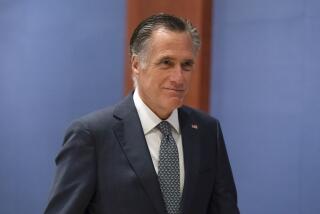White House, Senators OK Plan for Organ Transplants
- Share via
WASHINGTON — The Clinton administration has crafted an agreement with key senators on legislation to revamp the nation’s organ transplant system, pointing the way toward an end to the contentious two-year struggle over who decides how these precious resources are distributed, senators and administration officials said Wednesday.
The compromise measure, hammered out late Tuesday night among administration officials and Sens. Bill Frist (R-Tenn.) and Edward M. Kennedy (D-Mass.), was approved unanimously Wednesday by the Senate Health, Education, Labor and Pensions Committee. It will be sent to the full Senate for a vote after next week’s congressional spring break, where it is expected to be approved.
The legislation differs, however, from the House bill passed last week--a version President Clinton has promised he would veto--and differences will have to be resolved in a House-Senate conference committee.
The Senate bill “will help to balance the difficult ethical and medical decisions that accompany decisions about how organs are distributed,” said Frist, who was a transplant surgeon before being elected to the Senate.
The compromise, he said, “is in the best interest of all patients because it focuses on developing new policies based on scientific data, medical principles and equity.”
Health and Human Services Secretary Donna Shalala said that the compromise, if enacted, “would provide a sound foundation for moving toward a better, fairer” system.
She acknowledged that “no single party achieved everything it wanted” with the Senate bill but that it represents “a day-and-night improvement” over the House measure.
But the House Commerce Committee, which wrote the House version, called the Senate bill “misguided” and a thinly disguised White House plan to give Shalala more authority. Committee Chairman Thomas J. Bliley (R-Va.) remains “committed to providing the best protection for organ transplant patients,” it said.
The Senate legislation skirts the most divisive issue: the argument over how to distribute scarce organs. But it sets up a mechanism to resolve fights between the federal government and the United Network for Organ Sharing, the private contractor that runs the system, by establishing a panel of outside experts to mediate future disputes.
The current controversy arose over the administration’s attempt to change the organ network’s policy of distributing organs in local areas first before offering them regionally and then nationally. Shalala’s department sought to ensure that the sickest patients received organs first, regardless of where they live.
The House bill, siding with the network, would remove transplant oversight from HHS and give it to the network.
Under the Senate bill, however, the outside panel would have the authority to make final decisions on policy, based on guidelines set into the law. The panel--made up of 21 experts, such as surgeons, clinical researchers and medical ethicists--would be chosen by the HHS secretary, the transplant network and the Institute of Medicine.
Moreover, those guidelines would require development of a policy that would seek to reduce disparities in access that result from geography--a requirement representing a compromise with the administration, which sought to eliminate the disparities.
The Senate bill essentially would permit the organ network to write allocation policy but would permit the committee of experts to intervene if the government disagrees with the private contractor. The panel would have the final word, based on the guidelines.
“This is not an easy issue to wrestle with--there aren’t any evil people involved in this who are trying to do bad things,” said Mark Rosenker, the network’s managing director and assistant executive director for external affairs. “Everybody wants to do the right thing. We all just have different ways of getting there.”
The issue has commanded increasing attention at a time when the nation is experiencing a crucial shortage of organs. Every day, according to medical estimates, 12 Americans die while waiting for an organ, and about 68,000 people are waiting for transplants at any given time.
Simultaneously, advances in transplantation have made the medical procedure increasingly successful, putting even greater pressure on the organ allocation system.
More to Read
Sign up for Essential California
The most important California stories and recommendations in your inbox every morning.
You may occasionally receive promotional content from the Los Angeles Times.












